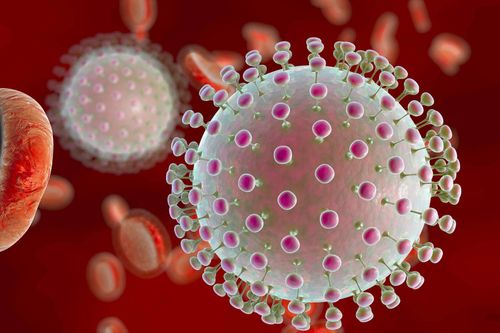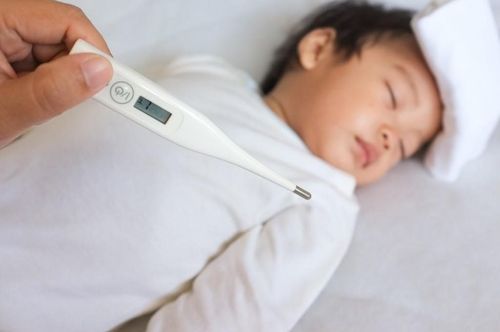This is an automatically translated article.
The article was consulted with MSc Duong Van Sy - Department of Pediatrics - Neonatology, Vinmec Hai Phong International General Hospital.According to the World Health Organization (WHO), neonatal microcephaly is a condition in which the head of an infant is significantly smaller than that of a child of the same age and of the same sex. Head size is one of the important indicators to monitor a child's development.
1. What is microcephaly in infants?
Children with microcephaly often have a smaller than normal brain size and may have abnormal brain development. The severity of microcephaly can range from mild to severe and can be present at birth (congenital) or later in development.Microcephaly can occur because during fetal development, the baby's brain has not developed properly, or stops developing after birth, resulting in a small head size. Microcephaly can be isolated, meaning it can occur without major birth defects, or it can also be associated with other serious birth defects.
2. What are the signs and symptoms of microcephaly?
In mild cases, the baby has a small head but no other problems. The baby's head will grow as it grows. However, it will still be smaller than normal babies.Some children have normal intelligence. Other children may have learning problems, but they don't get worse as they get older.
Other symptoms may include:
Problems with balance and coordination Developmental delays (delayed sitting, standing, walking) Difficulty swallowing and eating. Hearing loss Hyperactivity (inattentiveness or inability to sit still) Convulsions Short height Language problems Vision problems.

3. How serious is microcephaly?
Microcephaly can be caused by a baby's brain not developing normally during pregnancy, or being damaged at some point during pregnancy and not growing anymore. Children with microcephaly can have many other problems, depending on how severe the microcephaly is. As of now, microcephaly is associated with the following health problems:Seizures; Developmental delay, for example poor language development or failure to achieve normal developmental milestones (such as sitting, standing, and walking); Intellectual disability (impaired ability to learn and skills for daily living); Problems with movement and balance; Eating difficulties, for example difficulty swallowing food; hearing loss; visual impact. These problems can range in severity from mild to severe and often last a lifetime. Because microcephaly can be difficult to predict at birth, children with microcephaly need regular medical check-ups to monitor their development closely.
4. How to treat microcephaly in children?

Early intervention and treatment will help children with microcephaly, like children with many other malformations, improve and maximize their physical and intellectual abilities. Your child may need speech, motor, and physical therapy therapy and may need medication to help combat seizures and other symptoms.
4.1 What methods are used to treat microcephaly? There is no cure for microcephaly, but there are treatments that help with development, change behavior, and reduce seizures.
If your child has mild microcephaly, take him or her regularly to monitor his growth and development.
Children with more severe cases require lifelong treatment to control symptoms such as seizures, which can be life-threatening. Your doctor will discuss treatments to keep your child safe and improve quality of life.
4.2 How to properly handle microcephaly in children? An infant with microcephaly will undergo an examination that includes brain scans and tests to determine the cause of the birth defect. If your baby was born in an area affected by the Zika virus, he or she will also be tested for the virus. Your baby will also be tested for vision and hearing. Some babies born with microcephaly, especially those born into families with many microcephaly, usually don't have any health problems and develop completely normally. Some children have many difficulties, delay in the development of speech, motor and eating skills. The defect also leads to vision and hearing problems, seizures, and intellectual disability. According to experts, the most important thing is to determine the cause, from which they will be able to speculate on what will happen in the future. Babies born with microcephaly need to be closely monitored during the first year to check their development, so that the necessary support can be given to the baby. In general, parents of children with microcephaly need to contact a network of specialists that includes pediatricians, child neurologists, speech and physical therapists, and other specialists. skills...But first and foremost, babies need to be raised in a loving environment. 4.3 Suitable mode of living

Find a team of trusted professionals. You will need to make important decisions about your child's education and treatment. The specialties your child can request include pediatrics and developmental pediatrics, infectious diseases, neurology, ophthalmology, genetics, and psychology. If your baby has microcephaly, be careful with future pregnancies. Consult with your doctor to determine the cause of your child's microcephaly. If the cause is genetic, you and may need to talk to a geneticist about the risk of microcephaly in subsequent pregnancies. As a key area of Vinmec Medical system, Pediatrics Department always brings satisfaction to customers and is highly appreciated by industry experts with:
Gathering a team of leading pediatricians: including leading experts with high professional qualifications (professors, associate professors, doctorates, masters), experienced, worked at major hospitals such as Bach Mai, 108.. Doctors All are well-trained, professional, with a mind - range, understanding young psychology. In addition to domestic pediatric specialists, the Department of Pediatrics also has the participation of foreign experts (Japan, Singapore, Australia, USA) who are always pioneers in applying the latest and most effective treatment regimens. . Comprehensive services: In the field of Pediatrics, Vinmec provides a series of continuous medical examination and treatment services from Newborn to Pediatric and Vaccine,... according to international standards to help parents take care of their baby's health from birth to childhood. from birth to adulthood Specialized techniques: Vinmec has successfully deployed many specialized techniques to make the treatment of difficult diseases in Pediatrics more effective: neurosurgery - skull surgery, stem cell transplantation. blood in cancer treatment. Professional care: In addition to understanding children's psychology, Vinmec also pays special attention to the children's play space, helping them to have fun and get used to the hospital's environment, cooperate in treatment, improve the efficiency of medical treatment.
Please dial HOTLINE for more information or register for an appointment HERE. Download MyVinmec app to make appointments faster and to manage your bookings easily.














